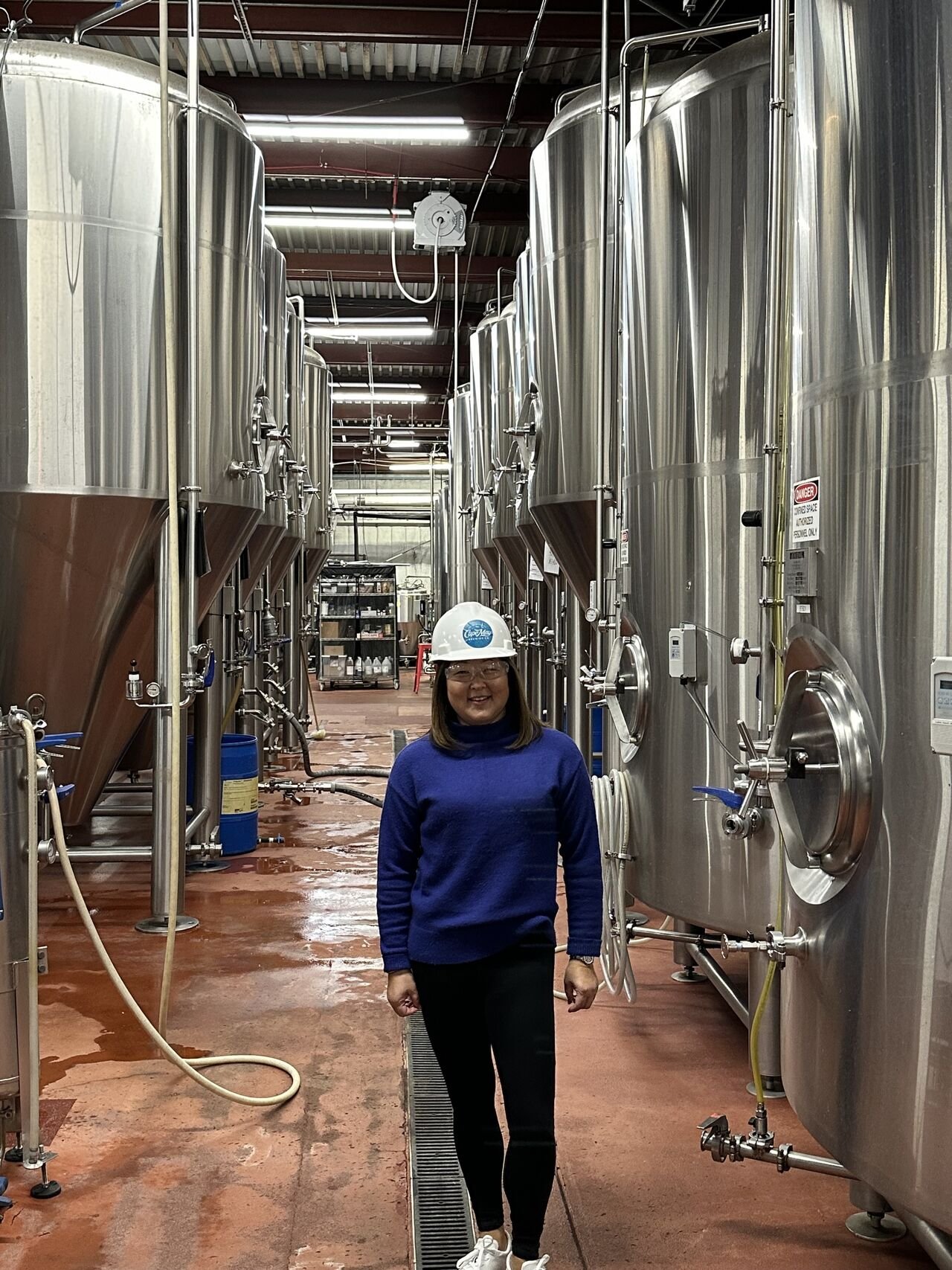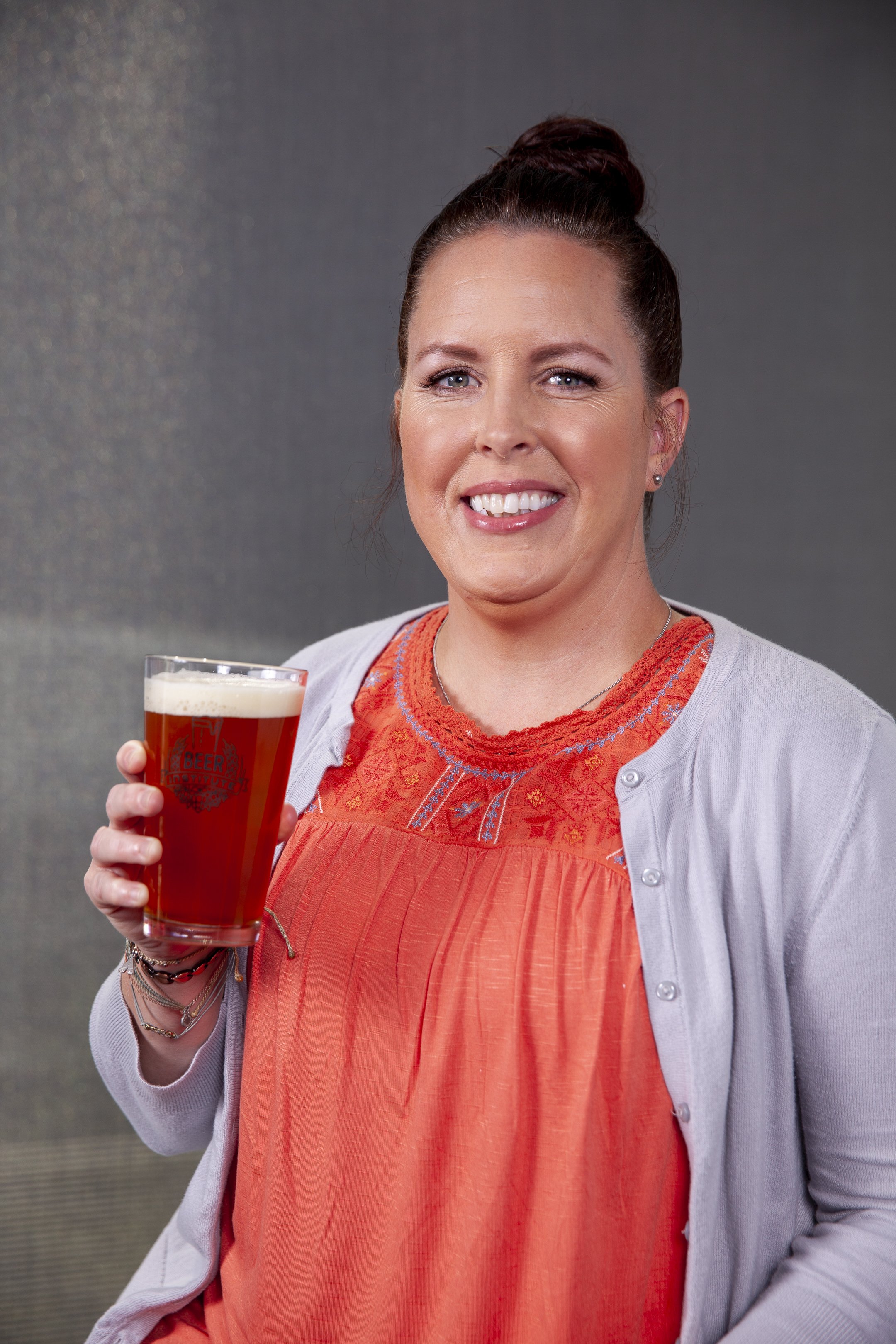
Driving Industry Alignment and Growth
Beer Institute 2023 Annual Report
A message from our President & CEO
Voting Board
Brendan Whitworth
Anheuser-Busch
CEO & Zone President, North America
Chairman, Beer Institute
Gavin Hattersley
Molson Coors Beverage Company
President & CEO
Vice Chairman, Beer Institute
Jim Sabia
Constellation Brands
Executive Vice President and President, Beer Division
Director, Beer Institute
Fred Matt
F.X. Matt Brewing Company
President & CEO
Director, Beer Institute
Maggie Timoney
HEINEKEN USA
President & CEO
Director, Beer Institute
Management Committee
Richard Crawford
Molson Coors Beverage Company
Senior Director, Federal Government Affairs
Alternate Director, Beer Institute and Vice Chairman,
Beer Institute Management Committee
Dan Keniry
Anheuser-Busch
Vice President, Federal Government Affairs, Anheuser-Busch
Alternate Director, Beer Institute and Chairman and Treasurer,
Beer Institute Management Committee
David Morgenstern
HEINEKEN USA
Senior Director, Government Affairs
Alternate Director, Beer Institute
Matt Stanton
Constellation Brands
Senior Vice President, Public Affairs
Alternate Director, Beer Institute
Speaking with One Voice: BI Establishes the Brewers’ and the Suppliers’ Councils
The Beer Institute established two councils in 2023 that collaborated with the organization’s largest members to elevate the impact of the association’s advocacy efforts.
“The creation of the Brewers’ Council and the Suppliers’ Council marks a significant milestone for the Beer Institute, empowering small- and mid-size brewer and supplier members with an amplified voice on critical policy issues that affect our $409 billion industry,” said Brian Crawford, president and CEO of the Beer Institute. “Now more than ever, the beer industry must speak with one, powerful voice. We are earnestly seeking to expand the membership of both councils to ensure alignment amongst all segments of the beer category to help us in growing beer’s share of the U.S.’s alcohol beverage market.”
Both councils elected chairmen this year. President and CEO of F.X. Matt Brewing, Fred Matt, a fourth-generation brewer and leader of a brewing company with 135 years of history, is the Brewers’ Council chairman and represents small brewers on the Beer Institute Voting Board. President and CEO of S.S. Steiner, Inc., Louis Gimbel, who leads a company with a history of more than 170 years of hop production, is the chairman of the Suppliers’ Council.
The Beer Institute thanks all the members of these councils for participating in this new way of working in the organization, and we look forward to working with all our members to advance smart and innovative policies that move the beer industry forward.
Unblurring the Lines: Highlighting Beer’s Uniqueness While Combatting Big Liquor’s Lies
The The U.S. government has recognized the differences between beer and liquor since Prohibition’s repeal in 1933. The liquor lobby is attempting to undermine this system to line the pockets of multibillion-dollar liquor conglomerates. Any adult consumer knows that a vodka martini is not the same as a beer, but the liquor industry is trying to blur the lines surrounding canned cocktails as they have pushed them more aggressively to consumers in recent years.
The liquor lobby is seeking to manipulate the tax code to give canned cocktails an advantage over beer. Massive liquor corporations want their canned cocktails to be taxed like beer in order to recruit consumers to their higher ABV products.
During the first year of the 118th Congress, beer and wine trade organizations joined lobbied Congress on the importance of differentiation. The Beer Institute, along with the National Beer Wholesalers Association (NBWA), Brewer’s Association (BA), Wine Institute (WI), and Wine America (WA), met with offices that oversee the tax legislative writing process and leadership on Capitol Hill. During these meetings, the coalition emphasized the importance of keeping beer, wine, and liquor separate in the tax code, as they were post Prohibition, and more recently when the Craft Brew Modernization and Tax Reform Act (CBMTRA) was made permanent in 2020. Because of our collective efforts, no federal legislation has been introduced to upend the long history of differentiation due to beer and wine’s efforts to remind legislators of the importance of differentiation in our industry.
At the state level, we have found that legislators are calling the liquor industry out for its deceptive tactics in trying to undercut longstanding state excise tax rates. In 2023, the Beer Institute continued to coordinate a coalition of beer industry advocates to educate legislators across the country and to fight back against the liquor industry’s attempts to blur the lines between liquor and beer by manipulating the tax code.
Because of the incredible grasstops efforts of our members across the country —we were able to defeat bills introduced by the liquor industry and their allies in more than a dozen states, including Alabama, Arizona, California, Colorado, Connecticut, Hawaii, Minnesota, North Carolina, North Dakota, Oklahoma, Oregon, Tennessee, Texas, and Washington State. When presented with the facts of how these products are different and how individual states would be disadvantaged if they gave special treatment to certain products, legislators rejected these lopsided policies.
To aid in the ongoing differentiation fight, the Beer Institute launched StandWithBeer.org , a grassroots educational platform that showcases the economic and social impact of the $409 billion American brewing industry. The website’s core mission is to provide a comprehensive resource for consumers, the press and elected officials to learn about how beer is unique and provides more options and transparency to consumers than other forms of alcohol. StandWithBeer.org also exposes the tactics liquor companies use to exploit tax loopholes that allow them to lower their effective tax rate to the detriment of American consumers and taxpayers including IRC 5010 and the rum cover-over. StandWithBeer.org empowers consumers to make more informed choices and have their voices heard. We invite all beer enthusiasts who make beer America’s favorite alcohol beverage to visit this platform and stand up for beer.

Highlighting Unprecedented Industry Competition
In 2023, the BI mobilized to address the Alcohol and Tobacco Tax and Trade Bureau’s (TTB) regulatory initiatives stemming from Biden’s Executive Order on Competition. Most significantly, the BI submitted substantive comments on whether changes to trade practice regulations were necessary or appropriate. Noting the robust competition in the beer sector and the more than 9,200 brewers of all sizes nationwide (including at least one in each congressional district), the BI argued against a rewrite of trade practice regulations and encouraged the TTB to consider the realities of today’s beer marketplace and not to advance largely hypothetical academic arguments about competition. The BI encouraged the TTB to remember the significant economic contributions of brewers as employers, job creators, and product innovators. Without question, the beer industry plays an important role in helping drive local economies forward. The beer industry supports nearly 2.4 million jobs, including at bars, restaurants, grocery stores, and convenience stores. We will continue to advocate for the highly competitive beer industry should the TTB issue any trade practice regulatory proposals in the near future.
Exposing Anti-Consumer Behavior in the Aluminum Markets
Imported primary aluminum and cansheet are critical to the beer industry, as more than 74% of all beer produced and sold in the U.S. is packaged in aluminum cans and aluminum bottles. To compete, American brewers need a fair and transparent pricing system for aluminum.
The Beer Institute supports the repeal of the 232 tariffs establishing tariffs on imported aluminum, as well as the increased transparency of aluminum benchmarking entities and the Midwest Premium (MWP), a confusing mechanism that determines the price of aluminum in the U.S. Over the last five years, the American beverage industry has paid nearly $2.2 billion in Section 232 aluminum tariffs, in large part due to the MWP, which allows aluminum companies to charge inflated prices with no oversight.
In addition to supporting legislation, including the Aluminum Pricing Examination (APEX) Act, which would provide the Commodity Futures Trading Commission and Department of Justice with the necessary authority to provide oversight over price benchmarking entities, this year, we launched MidwestPremiumExposed.org to shine a light on shady aluminum pricing.
MidwestPremiumExposed.org educates consumers, regulators, and legislators about the MWP in an easy-to-understand way. With increased transparency in aluminum markets, purchasers would no longer be forced to pay tariffs on aluminum that should not be subject to them, and competition would increase. The result of this process would be lower prices for consumers on goods made with aluminum, such as cans, automobiles and more.
MidwestPremiumExposed.org is one large step toward holding companies accountable, bringing transparency and competition back into the aluminum market, and delivering relief for brewers and countless other industries hurt by inflated aluminum prices.
Modernizing the Advertising and Marketing Code
The Beer Institute continually reviews its Advertising and Marketing Code and Buying Guidelines to ensure that the language reflects current advertising methods and means and addresses appropriate responsibility standards.
The Beer Institute began a comprehensive review of the current ad code over a year ago. This review involved considering many issues, including ways to modernize, simplify, and update the language of the code. Before completing this process, the Beer Institute made two significant interim updates to the code:
In December 2022, language was added regarding the marketing and advertising of alcoholic variants of non-alcoholic beverages.
In 2022 and 2023, the audience demographic standard was updated based on updated population data from the Census Bureau in 2023. At least 73.8% of the audience for any beer advertising and marketing placements must be adults of legal drinking age.
The Beer Institute calls out the following additional changes reflected in the updated Code as a result of the review:
In furtherance of the long-standing commitment by Brewers to avoid advertising and marketing elements that appeal primarily to people below the legal drinking age, the Code now provides that an advertising or marketing element has a "primary appeal" if it appeals to more underage persons than persons of legal drinking age.
The Code includes an updated definition of Digital Media, which matches the one in the Buying Guidelines and provides additional helpful guidance to Brewers regarding advertising through this increasingly common form of media.
The Code previously referenced social media sites, and both Beer Institute members and the Code Compliance Review Board (CCRB) applied the Code's standards to Social Media Influencers. The Code now defines the term Social Media Influencer. The new definition and other language in the Code regarding Social Media Influencers provide additional helpful guidance to Brewers regarding advertising through this increasingly common form of media. Other updates call on social media influencers posting beer-branded marketing and advertising on behalf of a brewery to implement available age-gating measures to restrict persons below the legal drinking age from accessing that beer-branded marketing and advertising. The change reflects existing industry practice.
Brewers have long committed to regularly monitoring user-generated content posted on their websites, branded social media channels, or other beer-branded digital media sites, and beer-branded social media influencer marketing content posted on behalf of the brewery for compliance with this Code. The updated Code clarifies that if a Brewer finds content that does not comply with the Code, the Brewer will take appropriate action to correct or remove the content or request correction or removal. Again, this change reflects existing industry practice.
The Beer Institute recognizes that parents play a significant role in educating their children about the legal and responsible use of alcohol. They may wish to prevent their children from accessing Digital Media without parental supervision. To facilitate this exercise of parental responsibility, the Beer Institute commits to provide to parents, upon request, the names of producers of parental control software and applications that allow parents to block, filter and monitor the websites, social and Digital Media sites their children may access on their computer or mobile devices.
Brewers commit to ensuring that they place any outdoor signage, not just billboards, further than 500 linear feet from any established and conspicuously identified elementary or secondary schools, place of worship, or any playground, field or sports facility that is public and intended primarily for youth athletics. The Code also clarifies that the preceding restriction does not apply to signage or outdoor advertising at public, sporting, cultural or civic events or locations licensed to sell alcoholic beverages.
While the Code previously addressed specific internet privacy policies, the updated Code uses more modern terminology, including a statement that Brewers will comply with all applicable privacy laws. Brewers will also employ a mechanism for consumers to opt-in to receive advertising and marketing communications from a Brewer and an opt-out feature to stop receiving such communications.
Concerning the Code Compliance Review Board (CCRB), the update clarifies that a complainant has to request a Board review within 45 days after receiving the Brewer's response to the complaint. Consistent with Beer Institute practice, the Code now states that both the complainant and Brewer may file supplementary information, if any, regarding a complaint with the CCRB. The updated Code also reflects that the Beer Institute will compile the complaint file, transmit it to the CCRB, and post the entire complaint file on the Beer Institute website after the CCRB issues its decision.
The updated Code provides that the Beer Institute will publish the Code and accompanying Buying Guidelines on its website at www.beerinstitute.org.

Promoting Our Partnership with Agriculture - No Farmers, No Beer
Throughout the year, the Beer Institute has worked with its partners in agriculture to help provide input and support for a robust farm bill. In partnership with the Barley Growers, Washington Hops Association, and the Farm Bureau, the BI team highlighted the importance of agriculture to the brewing process and its impact on the American economy. Funding for the farm bill was extended until September 2024, providing more time for the House and Senate agriculture committees to devote to careful legislation. In the interim, Beer Institute CEO Brian Crawford penned an op-ed for Agri-pulse titled “If You Like Beer, Tell Congress to Pass a Fresh Farm Bill.”
Increasing Our Impact: BeerPAC Establishes the 50 Cheers Campaign
This year, the Beer Institute made a commitment to strengthen BeerPAC, the Beer Institute’s bipartisan, bicameral federal political action committee established to promote the election of federal candidates who have demonstrated support for the beer industry. BeerPAC is critical to our success on Capitol Hill and strengthens the beer industry’s political voice.
In the fall, we announced the 50 Cheers Campaign to increase BeerPAC’s donor base. Once BeerPAC has 50 donors, it will attain multicandidate status, allowing us to donate up to $5,000 per election to a candidate. We launched a 50 Cheers Campaign webpage on the Beer Institute’s members-only portal, which has information on giving, frequently asked questions and political action committees in general. The website makes giving easier by having a credit card processing page available to all members. If you have any questions about donating to BeerPAC, please contact Annie Lange at alange@beerinstitute.org.
Ensuring Transparency on Dietary Guidelines & Health/Regulatory Policy
The 2025–2030 Dietary Guidelines for Americans (DGA) are still more than a year from release to the public. Still, the Beer Institute advocated throughout 2023 for transparency from federal government agencies regarding whether there was enough new scientific evidence to change the moderate drinking guidelines that have always been included in the DGA publication.
In February 2023, federal officers at the Departments of Health and Human Services (HHS) and Agriculture (USDA) who are supervising the re-write of the 2025 DGA unilaterally excluded the legislatively established Dietary Guidelines Advisory Committee from answering research questions on alcohol beverage consumption. In addition, they assigned the Substance Abuse and Mental Health Services Administration (SAMHSA) to write guidance for the 2025 DGA. Specifically, work was assigned to SAMHSA’s Interagency Coordinating Committee on the Prevention of Underage Drinking (ICCPUD). It is their intention for this process to continue indefinitely.
Neither SAMHSA nor the federal officers guiding the DGA process have disclosed details about the data used to inform its guidance on alcohol consumption. SAMHSA does acknowledge, however, that it must consider a congressionally mandated scientific report from the National Academies of Sciences, Engineering, and Medicine (NASEM). In the 2021 Consolidated Appropriations Act, Congress mandated that the USDA enter a contract with the NASEM to conduct systematic reviews of scientific research on alcoholic beverage consumption and health, ordering the USDA and HHS to use NASEM’s review when writing the DGA’s alcohol guidance.
In 2024, the Beer Institute will continue its advocacy and educate all stakeholders about our policy point, which is rooted in the National Nutrition Monitoring and Related Research Act of 1990 that established the DGA. The law requires a preponderance of scientific evidence or medical knowledge before changes can be made to any part of the DGA, including the moderate drinking definition. Ultimately, we work to defend the social acceptability of alcohol beverage consumption by maintaining the moderate drinking definition of up to two drinks per day for men and up to one drink per day for women.

Drunk and Drugged Driving Policy Priorities
The number of fatalities related to car crashes is increasing at a record-setting pace. According to the National Highway Traffic Safety Administration (NHTSA), this increase is due to all forms of hazardous driving behavior, including excessive speed, distracted drivers, and drunk and drugged drivers.
In 2023, the Beer Institute published a blog emphasizing brewers’ commitment to preventing drunk driving. It sought opportunities within Congress to advocate for measures to help states deal with drunk driving and impaired driving from multiple substances, including THC in cannabis products, benzos, and narcotics.
Beer Institute Drunk and Drugged Driving Public Policy Priorities
-
Persistent drunk drivers and drivers with BACs higher than .15 are still some of the most dangerous drivers on our roads. Policy measures that produce swift, certain, and escalated penalties are as necessary as ever.
-
Multi-substance impaired driving is the operation of a motor vehicle while impaired by drugs and alcohol or a combination of drugs. To identify, deter, and treat multi-substance-impaired drivers, the U.S. beer industry supports the multi-substance-impaired-driving-prevention objectives in NHTSA’s three-year strategy to reduce total traffic fatalities.
-
The Beer Institute is hopeful that emerging in-vehicle technology that senses when drivers are drunk or drug impaired, distracted, or sleepy will help reduce roadway fatalities. Late in 2023, NHTSA began the rule-making process that will clear the way to implement this technology when it released its Advanced Notice for Proposed Rulemaking (ANPR). Once the ANPR is published in the Federal Register, a 60-day comment period commences, and the Beer Institute looks forward to engaging in this federal process in 2024.
-
Education programs aimed at preventing all forms of impaired driving can be supported through public policy. Altering social norms, educating servers and sellers of alcohol beverages, educating the public on the effects of alcohol and other drugs, and encouraging the use of designated drivers and rideshare programs are all examples NHTSA cites in its “Uniform Guidelines for State Highway Safety Programs.”
Pouring Over the Last Year: Beer’s 2023 Economic Picture
Volume declined in 2023 as the beer industry faced challenges from a slowing economy, continued price increases for key beer commodities, and a pullback in consumer spending. The macroeconomic environment changed drastically in 2023 as interest rates rose, causing the economy to tighten. Historically, beer has been viewed as “recession-proof,” as consumers are relatively less price-sensitive to beer purchases compared to other alcoholic beverage purchases. Yet, strong headwinds and inflationary pressure has impacted all consumers.
Continued increases in prices were a hot topic in 2023. Upward price pressures began to moderate in 2023 as supply chain issues for barley, hops, and CO2 were resolved. However, prices for key commodities necessary to brew and package beer are significantly higher than a few years ago. According to the Producer Price Index, since the beginning of 2020, barley prices have increased by 29%, CO2 by 49%, and aluminum cans by 23%. High prices have impacted consumer choices of what to drink and how much to consume. As a result of these headwinds, the production of beer decreased in 2023. The total volume of beer shipments is down year-to-date (through October 2023) by 4.3%.
The pandemic shifted consumption habits in terms of where beer is consumed. On-premise channels remain below pre-pandemic levels. According to the Consumer Price Index (CPI), the price of beer on-premise increased by 5.2% over the past year, while at-home beer consumption increased by 2.7%. Most of the industry’s growth came from off-premise consumption, which grew in 2023, while on-premise consumption remained only slightly above 2022 levels.
Despite all of this, several emerging trends in 2023 indicated the resilience of beer and potential pathways for future growth. Mexican imports continued to grow and were up 1% year-to-date (through October 2023). Beyond beer segments, flavored malt beverages (FMB) had strong, double-digit growth in 2023. New innovations, such as non-alcoholic beer and hop water, retained a small share of the market but experienced continued growth. These innovative trends have the potential to grow the total category and bring in new consumers who currently do not drink beer.
Heading into 2024, beer remains the leader in the market share among alcoholic beverages. New avenues for product innovation promise to grow the total category and attract new generations to beer, which remains the go-to beverage for socializing and celebrating occasions with friends and family.
Promoting Beer Unity at Annual Meeting
This year, the BI welcomed our members from October 4–5 to Denver, Colorado, for an insightful and entertaining two days for our 2023 Annual Membership Meeting. Attendees were given an informative look at beer industry policy and the regulatory priorities of this year and told what we could expect for next year.
We debuted our first Leadership Forum, inviting the beer industry’s most influential leaders to an intimate, strategic, and thought-provoking session covering themes outside of the alcohol beverage space. We heard from Samanta Jordan (Future Today Institute) on emerging AI technologies and how the beer industry can make the most of them. We also had the opportunity to hear from Beth Sanner (former Deputy Director of National Intelligence and presidential intelligence briefer) on today’s hot-button national and global intelligence matters and how they shape our future. The Leadership Forum was an exciting and refreshing addition to our meeting, as it allowed our attendees to increase their understanding of the shifting landscape of topics outside of their immediate purview.
We were honored to have Denver Mayor Mike Johnston join us to kick off our General Session, during which we heard from many speakers, including Admiral Sandy Winnefeld (former Vice Chairman of the Joint Chiefs of Staff and retired four-star United States Navy admiral), Danelle Kosmal (BI) with her State of the Beer Industry report, and Mary Guiver (Whole Foods) and Matt Crompton (CGA by NielsenIQ) with a dive into current on- and off-premise trends, as well as in-depth panel discussions with beer industry leaders from the NBWA, BA, WBA, and Beer Canada.
We rounded out the meeting with a one-of-a-kind evening at Wings Over the Rockies Air & Space Museum, hosted by Molson Coors. There, attendees shared cold beer and good conversation in an airplane hangar surrounded by aircraft of all types. Those brave enough had the chance to try flying (and often nose-diving) their own planes in the flight simulator.















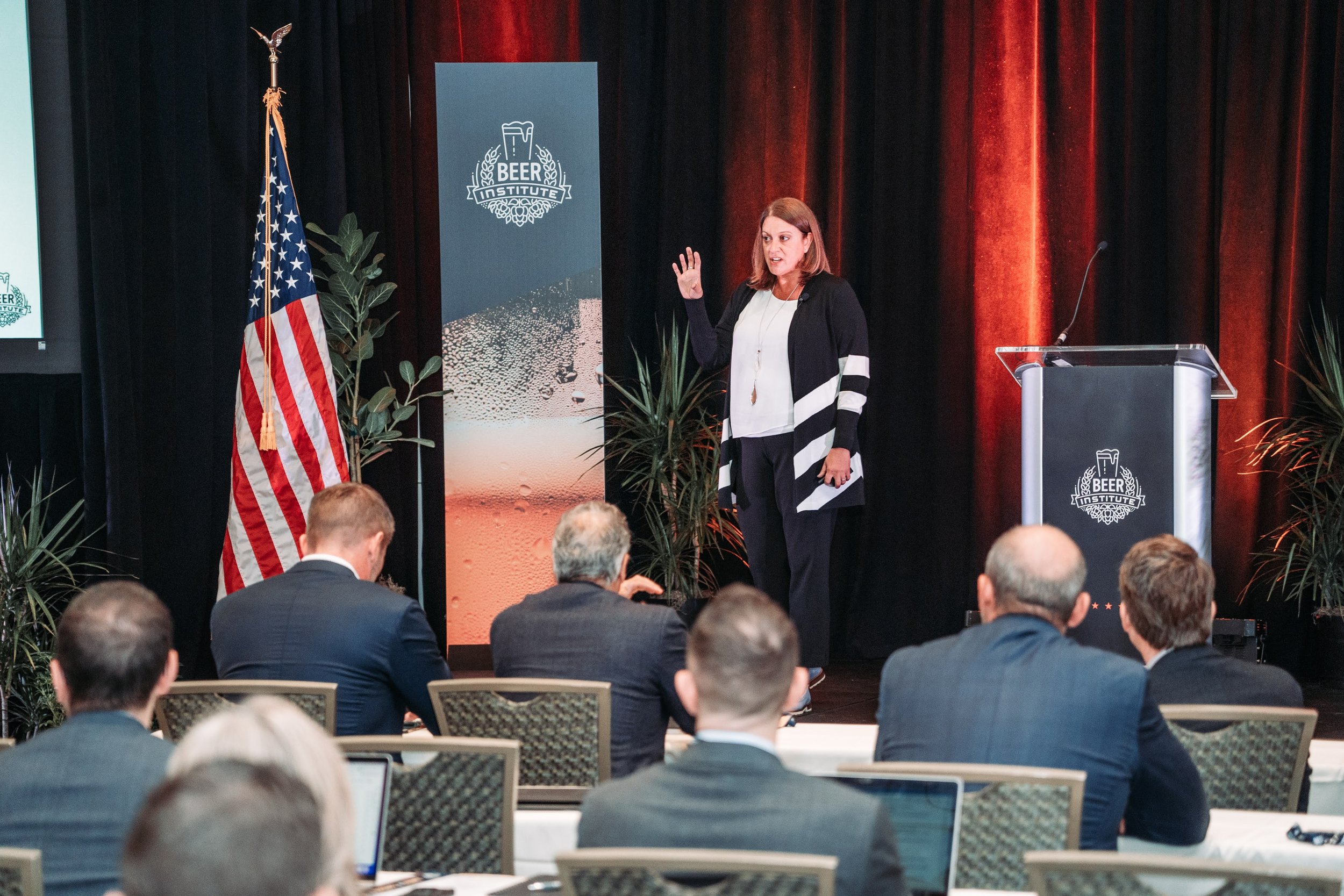

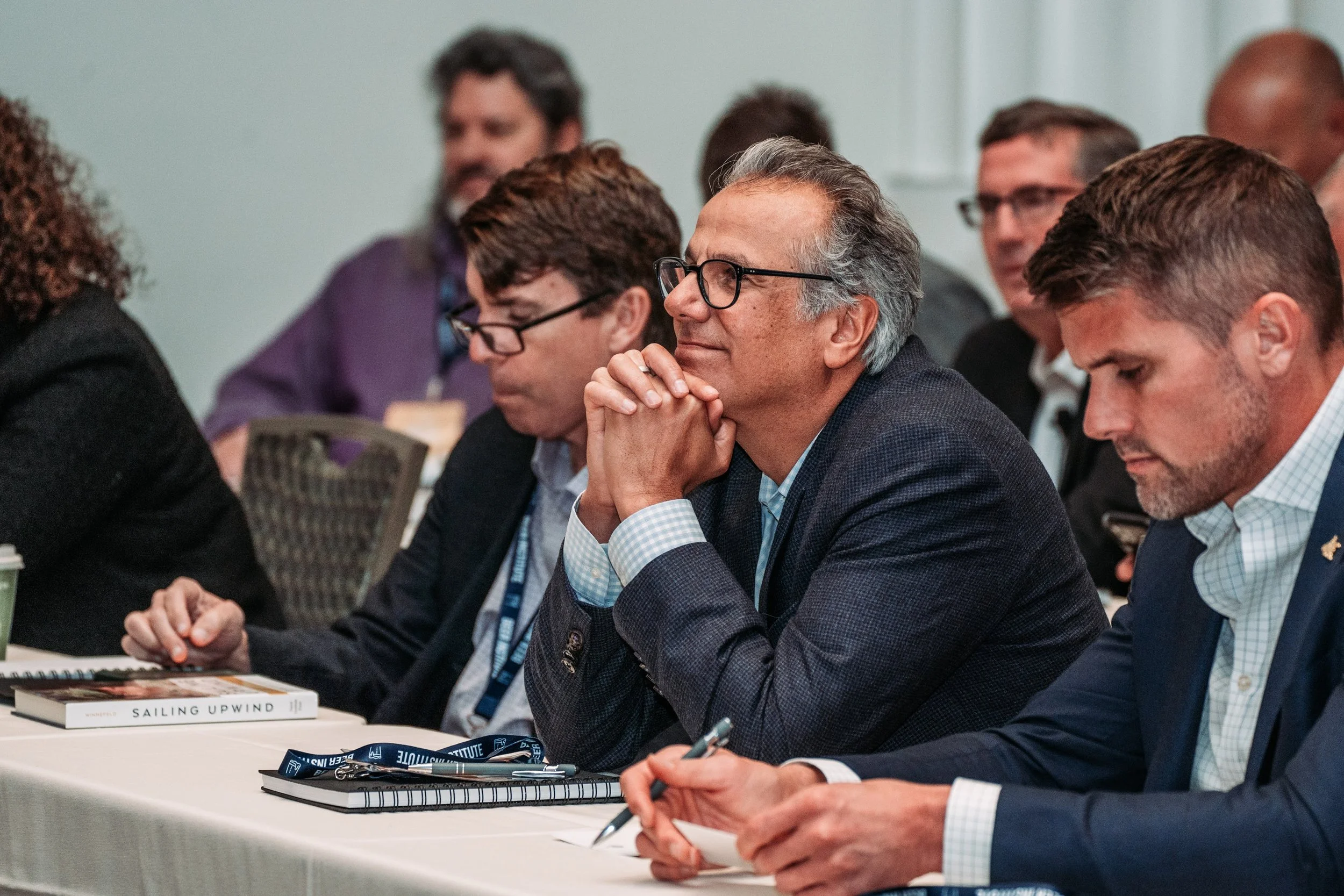
Frederick C. Miller Scholarship
The Frederick C. Miller Memorial Scholarship to the University of Notre Dame was established in 1955 in memory of the late Frederick C. Miller, Notre Dame alumnus and former president of the Miller Brewing Company, who served the brewing community with dedication and leadership. The scholarship provides financial assistance to the child of an active employee of a current dues-paying member or employee of the Beer Institute. This scholarship has enabled many employees of our member companies to send their children to this prestigious university. The amount awarded is based on the availability of resources from the scholarship fund, the number of qualified applicants, and the individual financial circumstances of the student.
As of June 30, 2023, the endowed fund distribution amount was $105,884, and the cumulative endowed fund distribution amount was $11,458,267. For Fiscal Year 2023, this fund benefited two students. In total, 12 students have won scholarships since 2005.
The scholarship’s bulletin for the academic year beginning in August/September 2025 will be available in August 2024 for applications to be received in early January 2025. If you do not receive the Members’ Bulletin to provide to your employees, email us at info@beerinstitute.org.
The Beer Institute looks forward to continuing to maximize the impact of this scholarship endowment for undergraduate students in the coming years.

Celebrating Beer All Year Long
After enthusiastically celebrating the 160th anniversary of the Beer Institute’s founding last year, the Beer Institute team kept up its momentum by continuing to celebrate and advocate for our vibrant industry in Washington, D.C., all year. We hosted or sponsored 28 events this year at the Beer Institute’s bar or an offsite venue. We invited to the bar the National Press Foundation, the Public Policy Institute, the National Association of Hispanic Journalists, the U.S. Chamber of Commerce, several Medal of Honor recipients, and many more groups to join us for cold beers and great company.
Off-campus, we sponsored dinners and galas for several prominent Washington-based organizations, including the Congressional Sportsmen’s Foundation, the Ireland Funds, the National Press Foundation, and the Audubon Society. We continued to leverage our connection with local gastropub Hawk ‘n’ Dove on Capitol Hill to host our annual Barley, Brews, & Boots reception, as well as our speakeasy-themed 90th Anniversary of Prohibition Repeal Celebration, with hundreds of Capitol Hill staffers in attendance at both events.
Before Memorial Day, we held our largest event of the year with our Kickoff to Summer celebration at the Bullpen in Washington, D.C. Nearly 1,100 people, including members of Congress, congressional staff, D.C. elites, and media figures, joined us to celebrate the start of summer while enjoying a variety of our member companies’ beers and live music from a popular local 90s cover band. The venue was decked out with our messaging on differentiation and beer’s place as America’s favorite alcoholic beverage. We can’t wait to do it again next summer and continue to build on the momentum and goodwill generated from these events in 2024.





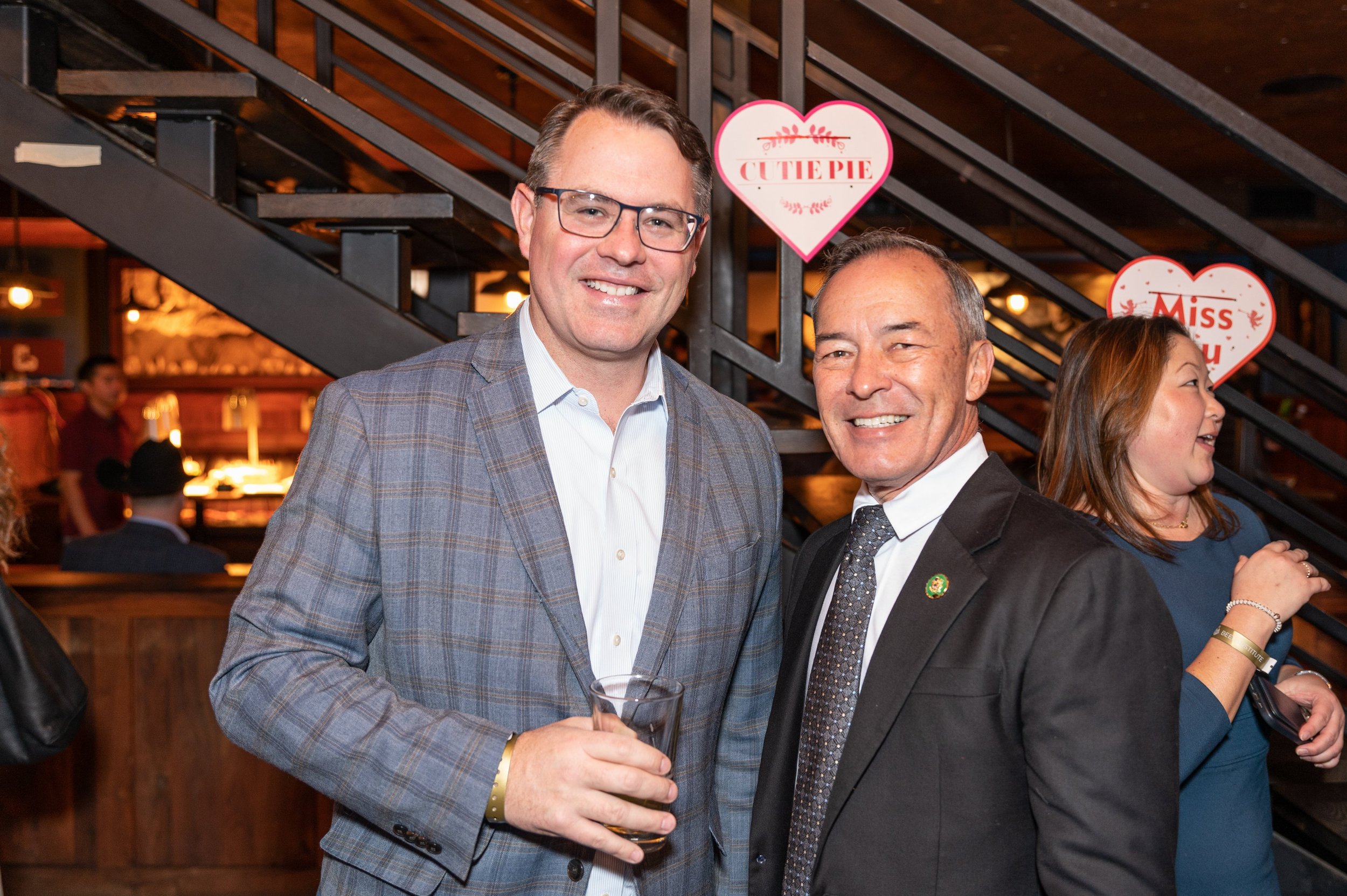






Brewing Headlines: BI in the News
On the media side, the Beer Institute and the National Beer Wholesalers Association rolled out the latest iteration of our biennial joint Beer Serves America study, showcasing the beer industry’s robust economic impact. The data was featured along with quotes from Brian Crawford and Danelle Kosmal in publications at the national level, as well as local outlets across the country. Throughout the year, Brian, Danelle, and Alex Davidson hit the airwaves to talk about beer on radio stations from coast to coast in Massachusetts, Washington State, New Hampshire, New Mexico, West Virginia, and Kentucky.
The Beer Institute Public Affairs team also worked diligently to make beer’s voice heard in the opinion sections of several print outlets, including the Wall Street Journal, RealClearPolitics, Bloomberg Tax, and the Washington Post. Brian, Alex, and Jeff Guittard also sat down in person with the Wall Street Journal in New York City to lead a fulsome discussion about beer’s policy objectives. The conversation lasted over an hour and touched on issues such as aluminum tariffs, differentiation, and public health guidelines, resulting in an editorial in the Wall Street Journal excoriating aluminum tariffs and the harmful effects they continue to have on beer and other domestic industries.
The Beer Institute Public Affairs team continued building stronger relationships with reporters through several events, including a beer pairing dinner at the renowned New York City eatery Prune. We worked with Master Cicerone Neil Witte and James Beard Award-winning Chef Celina Tio to take New York reporters and producers from outlets such as CNN, CBS, the Washington Post, MSNBC, Scripps, and more on an incredible culinary tour highlighting the wide variety and versatility of beer.
Earlier this year, we also worked with Neil Witte to host a one-of-a-kind introduction to the cicerone courses for Washington-based media called Beer 101. Neil collaborated with the Public Affairs team to give these reporters and producers an up-close-and-personal perspective on the brewing process and to educate them on the beer industry’s priority issues. Correspondents from Fox News, MSNBC, CBS, The Hill, the Daily Caller, and Bloomberg joined us. These events are critical in introducing beer’s issues to the public through news media and are great opportunities to drive home why beer is America’s favorite alcoholic beverage.



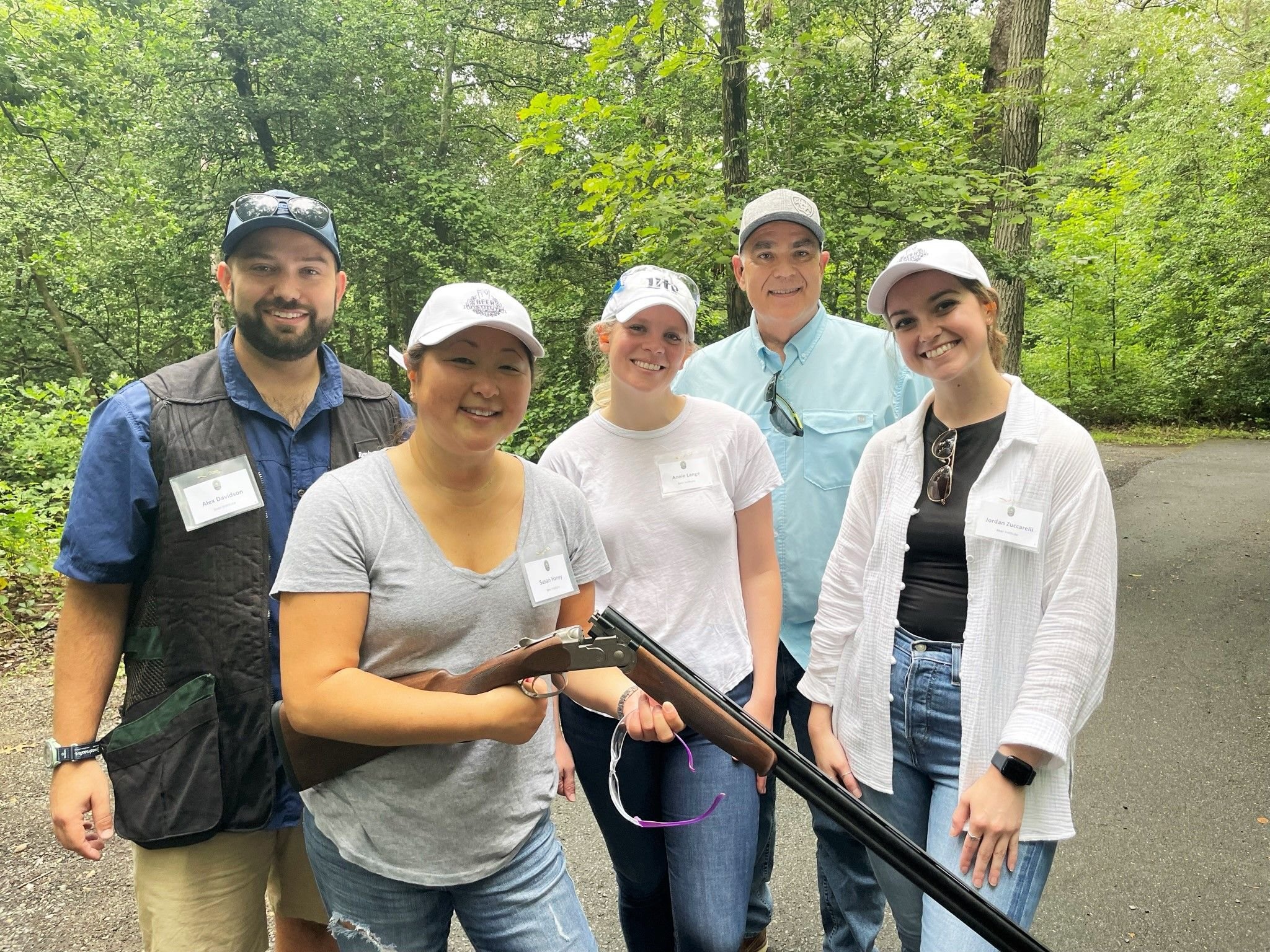







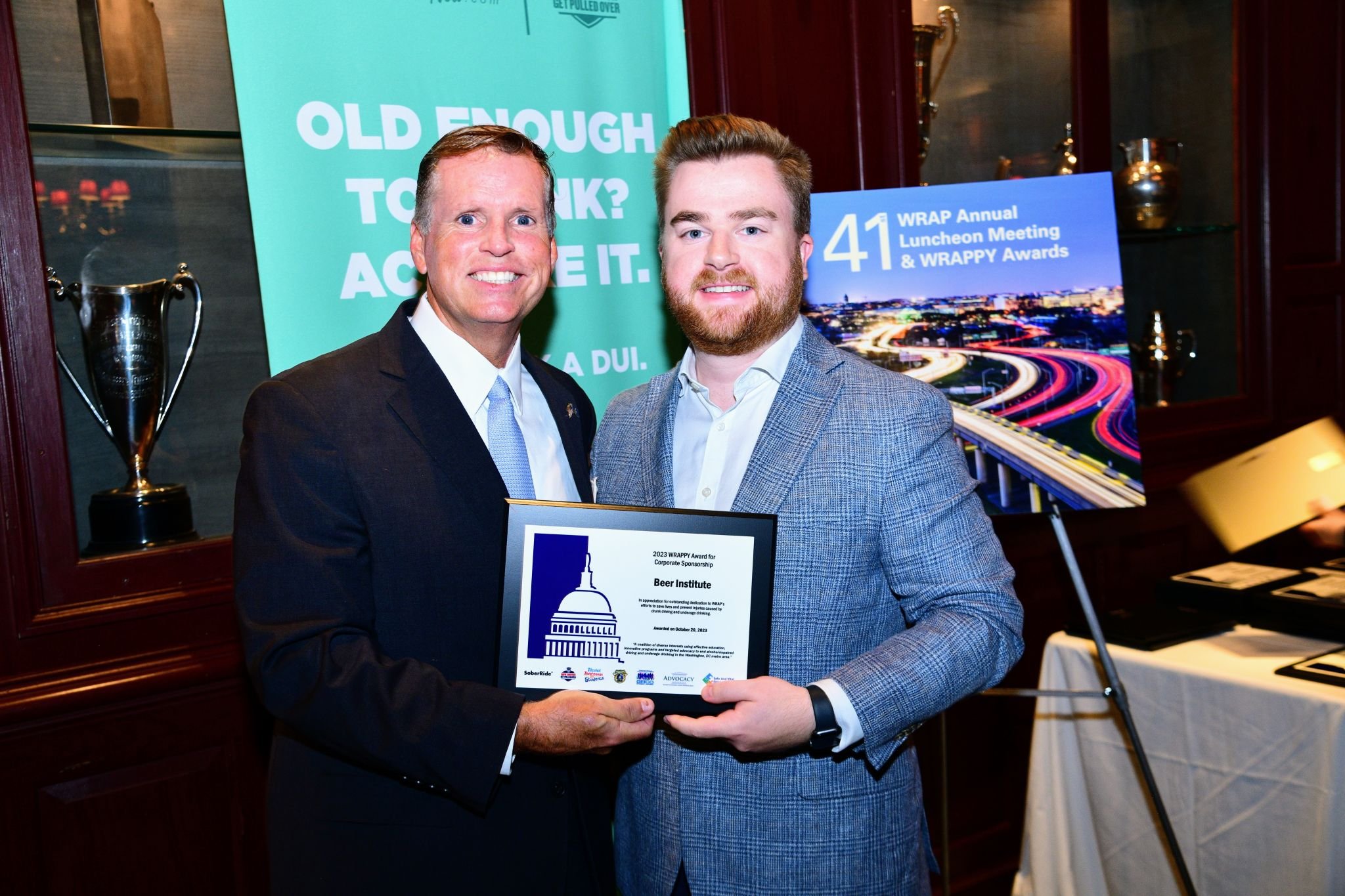
Media Mentions
Meet The Team


